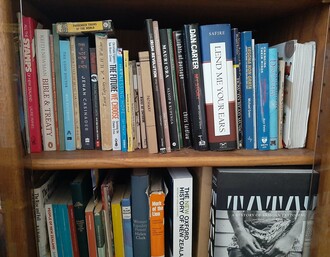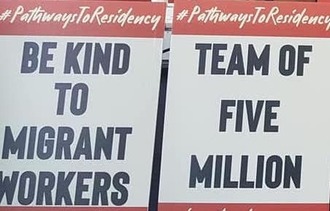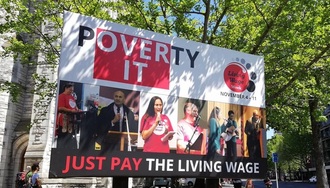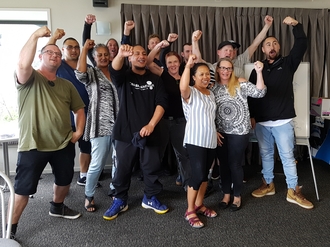-
Open Letter: Better support for artists during the pandemicTens of thousands of people are now without any employment or income. I know in the past you have been a large supporter and advocate for the arts, and for this I thank you. I look forward to your response and more importantly your action.304 of 400 SignaturesCreated by Jazmine Mary
-
Save Our National Passenger Rail NetworkTrains connect communities and are an important part of climate change action. In late 2021, KiwiRail, announced end of same-day intercity services between Auckland/Wellington and Picton/Christchurch. They were to be replaced by luxury multi-day rail cruises. In a win for this campaign, KiwiRail recently reversed that decision and reinstated the Northern Explorer and Coastal Pacific effective September 2022. While this is a win for the travelling public, it is not the end of the issue. Much of Aotearoa New Zealand remains disconnected by from the rail passenger network and other services, like the the Capital Connection between Wellington and Palmerston North, remain under threat from underinvestment. This comes at a time when the Government has said it is committed to climate action and reducing inequality. Trains have connected friends and families for graduations, weddings, holidays, and business for generations. They have connected towns with the cities, and bought our country together. But a period of privatisation and decades of underfunding has limited the development and use of our national rail network. Trains have an important place in our future but it requires investment and planning from this Government. 🛤 Rail provides a more sustainable and climate friendly method of transport across the country. 🛤 Rail can invigorate the social and economic life of small communities by making them accessible to remote workers and tourists. 🛤 Trains can bring our diverse country together by connecting them to people and landscapes across wide distances. 🛤 Trains provide an accessible method of point-to-point transport for the elderly and disabled. 🛤 Trains can help take traffic off the roads and improve road safety. Rail is an important part of our past, but it should also be part of our future. Join the campaign to support the retention of a national passenger rail network.12,488 of 15,000 SignaturesCreated by Patrick Rooney

-
Call to action on housing in KāpitiThe 240 houses that Kāinga Ora has across the District are not enough to house long-term homeless people, let alone the growing number of people who are coming onto the list. This includes people who formerly rented in the private sector and who have been given notice to leave their homes as landlords have decide to sell their properties. Even if there was an adequate supply of private sector accommodation, the exorbitant rents mean that people simply can't afford to meet that cost. There is strong support for this call for action across the entire Kāpiti population. Young people who can't afford to leave home; families with children who move in with their parents because they can't afford the rent demanded; an 85-year-old who has lived in the same unit for 17 years being given notice because the landlord is going to rent to a family member; working single people who can't afford a one bedroom flat - the scenarios come thick and fast and we hear them all.422 of 500 SignaturesCreated by Donna Bridgeman
-
End library book fines in ŌtautahiThere is "...no evidence that library overdue charges are an incentive for returning items on time. The experience of libraries in New Zealand and overseas is that overdue charges are a more effective deterrent and barrier to library usage, disproportionately impacting members of the community on lower and fixed incomes." (1). This change is important as it will bring Ōtautahi up to par with its peers across Aotearoa including Auckland, Carterton, Clutha, Dunedin, Masterton, Nelson, Selwyn, South Taranaki, South Wairarapa, Stratford, Upper Hutt, Waikato and Waimakariri that have, and or are removing these fines because evidence does not support that they work, and that they create barriers to access and learning. We have also seen post lockdown when the Council encouraged people to return books with a fee waiver we did, lets now make that permanent (2). (1). Report to Dunedin City Council from 27 October 2021 when they decided in favour- https://infocouncil.dunedin.govt.nz/Open/2021/10/CNL_20211027_AGN_1542_AT.PDF (2). https://newsline.ccc.govt.nz/news/story/libraries-issue-call-to-return-overdue-books295 of 300 SignaturesCreated by Josiah Tualamali'i
-
Urgently stop National Library from sending thousands of books to the PhilippinesThis petition was closed Nov 1st and presented to the House of Representatives Nov 22 More info on the Parliament-site https://www.parliament.nz/en/pb/petitions/document/PET_116636/petition-of-sandra-bianciardi-urgently-stop-national-library Because the parliamentary submission (presented on January 20th) appears to have stalled, we have decided to take the unusual step of publishing our submission. You may download the submission here: http://alpha.books.online.fr/Submission-20-1-2023.pdf December 2021, Rachel Esson announced the suspension of disposals, and we learned later on in February through the Dominion and Stuff that "consultations" were to happen with the "stakeholders". But in reality nothing has happened over the last 6 months: eventually in July this year, Rachel Esson, clearly confirmed to an OIA inquiry that the agreement with Internet Archive has NOT been cancelled or modified. https://fyi.org.nz/request/19611-internet-archive-agreement-and-update-of-the-list-of-books-to-be-sent-to-the-philippines#incoming-74684 The list of 428,232 books destined to be digitised in the Philippines and leave New Zealand forever, is the same list as it was before Christmas 2021. Nothing allows us to believe that a discussion will openly take place, on the contrary, the National Library's declaration indicates it is going in exactly the opposite direction. Let’s read once more what R. Esson expressed in Stuff: “People care so passionately. But the world’s moved on, and we don’t need to keep these [books],” she says. “It’s not good for New Zealand, and for us, to keep them. And they’re not being used. And they’re available elsewhere. All those arguments. We’ll find a way through, but I’m not sure that we can please everyone.” (Stuff, https://www.stuff.co.nz/entertainment/books/127618485/help-us-the-national-librarys-unsolvable-dilemma) Therefore, this petition is still as relevant as it was in its first days when it was launched by writers gathering at St Peter's Willis St, in DomStuff Nov 11, 2021. The voices heard at the event were very clear : https://www.stuff.co.nz/national/126965961/authors-gather-for-literary-protest-against-national-librarys-internet-archive-deal or check out Karyn Hay’s LATELY for a live cross just after the event https://www.rnz.co.nz/national/programmes/lately/audio/2018820187/authors-protest-national-library-book-disposal-in-wellington Here’s what you can do: Have a look and share your ideas on the facebook page "Writers Against National Library Disposals" https://www.facebook.com/groups/nodisposals Take a look at the list. Just scroll down to (or seek using Find) "Download the list of books": https://natlib.govt.nz/about-us/strategy-and-policy/collections-policy/overseas-published-collection-management the very identity and function of a National Library is called into question by its donation of the books to an overseas organisation, with no hope of ever recovering them. Therefore this petition not only asks for the Internet-Archive agreement to be cancelled, but also for public consultation about the future of the National Library of New Zealand, a library where professional librarians will be able to fill the collection with any books of the world they judge pertinent to New Zealand researchers and the public. "Who is Responsible" https://nodisposals.neocities.org/html/Who-Is-Responsible.html https://nodisposals.neocities.org/html/Situation-end-2021.html What has happened: Two years ago the National Library announced a plan to rid itself of most of its Overseas Published Collection. These books are national assets and should be treated this way. They contain a wealth of knowledge we do not want to lose. They will be costly to replace, and some will not be able to be replaced. Researchers, writers and students use this collection regularly. ▪︎ Over 600 000 books were initially slated for "secure destruction " by the National Library. ▪︎ The National Library's own statistics show these books are used about as much as any other part of the National Library's collection. ▪︎ 57 000 of the books were sent to a massive book sale at Trentham earlier this year. Approximately 10 000 sold. ▪︎ The National Library has entered into a contract to gift 428 000 books to an American company, Internet Archive, in return for digitising the books. The books will never come back again ▪︎ Internet Archive is facing a major lawsuit alleging breach of copyright in the USA and is opposed by writers and publishers groups nationally and internationally The National Library's rationale for getting rid of the books has shifted over time. ▪︎ It started as a cost saving exercise so it did not have to pay for storing them. "Secure destruction " was its original plan. Publishers figures for 2019 showed 2662 books were published in New Zealand. It would take 150 years to fill the space left by getting rid of the Overseas Published Collection. Extract from Scoop. 29 Oct "All the hard work of thoughtful librarians, their acquisitions and curation over the past century (and more), will be undone. The National Library is descended from the General Assembly Library, founded in 1862. (...) The books are part of our tradition. They are special items, not worthless, ageing assets – and their value is increasing with time. All attempts to persuade our politicians (...) have failed until now. These politicians, through the library’s directors, are effectively ‘legislating’ (in the philosophical sense) against our books. Public outcry is now our recourse." William Direen https://wellington.scoop.co.nz/?p=140249&fbclid=IwAR1tsZqoZ9uxsOyUS_acm17hmVrSgCJYMkcHqEUIDyMpiB263ZVJh5nNVRE We ask that ▪︎The contract with Internet Archive be cancelled Parliament must ensure that the National Library carries out its job in a careful, prudent way as envisaged by those who drafted the legislation it currently operates under.1,024 of 2,000 SignaturesCreated by Sandra Bianciardi
-
Call for safe and healthy journeys to schools🤸🏽♂️ Walking, biking and scooting are fun! 🌱 Being active helps to improve the retention of learning and our physical and mental well being. 🏃🏽♂️Our tamariki enjoy being able to get to and from school independently, while also reducing the workload for carers. 🌎 Active transport provides an incredible opportunity to tackle climate change. However, for many whānau, safety is a big barrier to walking, biking and scooting to and from school and access is a barrier to taking buses. When students in Waipa were surveyed, 87 percent said that they would like to walk or bike to school if their parents would let them. That’s why we’re asking the Government to commit to investing in safe infrastructure to school for all students by 2025. This includes installations like pedestrian crossings and protected bike and scooter lanes. We’re also asking the government to make public transport free for all school-aged children. Not only would this encourage more students to travel by bus, but it would reduce financial stress and barriers to education for many of our whānau. Funding dedicated school buses would provide better options for students where public transport routes don’t suit. When the Bay of Plenty Regional Council made bus travel free for all students travelling to and from school, 30 percent more students started taking the bus over just one year. That’s an awesome result! This is our chance to build a school transport system that works. That’s why we’re asking the government to prioritise school travel in its emissions reduction plan. Add your name to urge the Government to take urgent action for the climate, people and a better transport future! Please leave a personal comment to share why free fares and safe routes to school are important for you, your friends and whānau. Photo credit: @Bicycling. https://www.bicycling.com/news/a20046469/-49/53 of 100 SignaturesCreated by Go Eco

-
Return to COVID-19 EliminationA return to Elimination with improvements to the COVID Alert Levels is the way forward. We urge people to sign, to email their MPs, and to go on social media to say that we support a return to COVID Elimination, with improved economic supports, so we can effectively end the spread of COVID in our communities. The way to Level 1 is a supported Level 4. Our lives depend on it. The lives of our children and our whānau depend on it. We have done it before, we can do it again, if the government enables us.180 of 200 SignaturesCreated by Cassie Withey-Rila
-
Open Letter to the Hon Chris Hipkins – put Māori health needs firstWe are writing to express our extreme disappointment, concern and outrage at your statement on 06 October 2021 that you are not sure the Government would be stepping away from the Covid19 elimination strategy if the general population had the same vaccination rate as Māori. We believe that you have just confirmed the worst fears of many tangata whenua and tangata Tiriti people that the Crown still regards the Māori population as disposable? The implications of your statement are destructive. Firstly, the history of pandemics in this country has been a history of various forms of discrimination and neglect against Māori communities with the mass graves to prove it. Why would you perpetuate this tradition by making a statement that implies a high-risk community is not worthy of the highest level of consideration, protection and resources? The lower vaccination rates are a call to change monocultural strategies not a call to put them at increased risk when you know what that risk amounts to. Secondly you are failing the Crown obligations to be in an honourable relationship with whānau, hapū, iwi and all Māori organisations. Māori are not a minority group or stakeholder in the struggle against Covid 19. Their rangatiratanga means the Crown has an obligation to negotiate regarding changes to a strategy that has direct and potentially disastrous effects on Māori. Thirdly you are undermining the Māori communities and health professionals fighting so hard to work with you and protect people. The success of the vaccination programme in places like rural Tairāwhiti and Te Whānau Apanui, the generous and effective programmes led by urban Māori groups tell us what works. People have been giving their all to ensure this pandemic does not decimate a population with health issues caused by years of inequity in the health system.603 of 800 SignaturesCreated by Heather Came
-
Sign: Kindness for temp workersTemporary workers in this country are working in every essential industry such as food, healthcare, transport and many more. We are being used for the needs of industry, and the essential services of Aotearoa, yet then thrown away. The recent fast tracking of residency for migrants working in Aotearoa stuck in limbo is welcome. Yet there are more temp workers who are migrants compared to migrants in permanent work. We take on temporary work in a hope that we will have a chance to take a permanent position one day, yet without any guarantee. This work is a hope for a secure future where we can look after ourselves and our families. Temps do not have a contract as a permanent staff, but we do all the same work on casual contracts. For example, I've been working in a role for a large New Zealand company for the past 5 months, for 40 hours per week. I was promised to be given a permanent role in 3 months. If I got a permanent role, I would be eligible for the new resident visa. When I contacted my recruitment agency, they said that I don’t have a contract which has a 'job description'. It shows that I’m on a casual contract. I am hearing stories from lots of temp workers who are in great distress. Recruitment agencies and companies are not on our side. The new migrant parthway to residency helps so many people. Yet when we introduce an ambitious policy like this, which brings change, it needs to consider everyone at the edge of society. The government’s attention towards the temp workers will bring hope for all of us, that we're not left behind. Sign to support pathways to residency for temporary workers too. https://www.rnz.co.nz/news/national/452592/government-offers-one-off-visa-to-fast-track-skilled-migrant-residency38 of 100 SignaturesCreated by Vishaal Cruz
-
Tautoko Waikato Bus Drivers with a Living WageA Living Wage is the income necessary to provide workers and their families with the basic necessities of life. The Living Wage enables workers to live with dignity and to participate as active citizens in society. Research has found a Living Wage enables employees to be able to spend more time with their families, feel valued, be less stressed and consequently happier and more motivated in their workplaces. Bus drivers provide an essential public service for our communities across the Waikato. Currently, bus drivers employed by Go Bus, a council-contracted bus company, are paid below the Living Wage. The drivers love their jobs and they love serving the public, but the low wages mean that they are struggling to survive. By signing this petition, you are sending a strong message to the Waikato Regional Council that they need to immediately lift the wages of Waikato bus drivers so they are fair and liveable. In addition to paying council-contracted bus drivers the Living Wage, we are urging the council to set a minimum standard of a Living Wage in all council service contracts. This would mean that the Living Wage becomes a standard for council tendering contracts and procurement.211 of 300 SignaturesCreated by Danielle Marks
-
Give Students a Course Related Costs Increase due to LockdownLast year during level four lockdown students were given the ability to borrow an extra $1000 against their student loan for course related costs. For many students this provided a lifeline and peace of mind in a time of great financial insecurity. Lockdown often creates extra costs for students in terms of equipment needed to study at home, extra power and heating bills etc while simultaneously causing many students to have less income coming in. We have been in level four lockdown for two weeks with Auckland just announced as having at least two more weeks of level four. However the government has not increased course related costs or provided any direct support to students. This needs to change.65 of 100 SignaturesCreated by Bronte Page
-
People Must Be PaidWe are all doing our bit to help eliminate the latest COVID outbreak in New Zealand. While some of us may be essential workers, most of us will be off work, staying at home as required by the Government. The Government will again spend billions of dollars on wage subsidies for employers to help pay our wages while we stay home to break the chain of transmission. This is the right thing to do – but it also means that employers should deliver on their responsibilities too. But some employers aren’t applying for the subsidy. They are just asking their workers to stay at home without pay. They are refusing to pay employees who are required to stay at home due to the lockdown, or if they are immune compromised. That’s not right – and we are asking the government to make sure that they are enforcing the law as quickly and rigorously as possible. The union movement is calling on the Government to make sure that all workers are getting paid during the lockdown, regardless of whether their company decides to apply for, or is eligible for, the wage subsidy. It’s the law. Employees shouldn’t have to wait months for pay or have to take their employer to court for the money they are owed. We ask you to sign this petition to call on the Government to ensure that all companies pay their workers during the lockdown. All workers should get the pay they are owed so that they can look after their families and whanau. Sign the campaign today. This is a campaign led in partnership by First Union, E tū and Unite Union. https://www.digitalwings.nz/images/Etu-Logo.jpg https://www.firstunion.org.nz/vendor/FUNZ/Assets/public/images/FUNZ/logo-white.png3,241 of 4,000 SignaturesCreated by FIRST Union .

.png)
.png)









_(1).jpg)